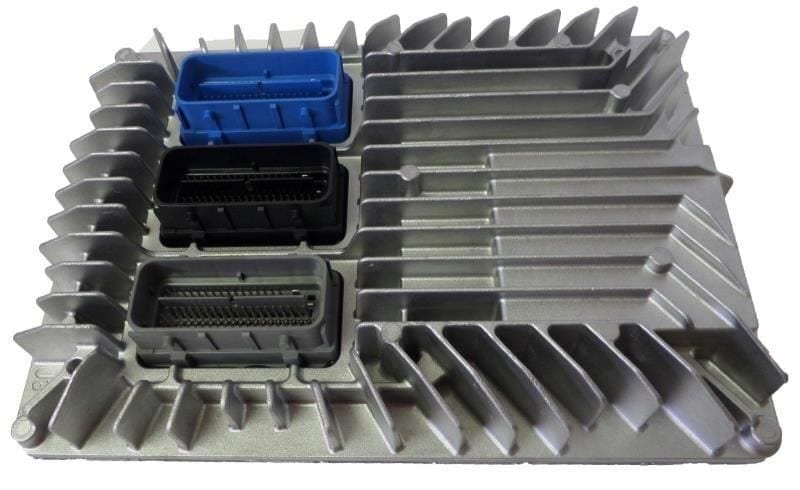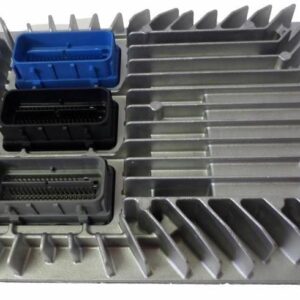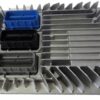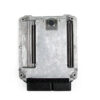Restore Peak Performance to Your GM Vehicle
Is your 2010-2011 GMC Terrain or other compatible GM vehicle suffering from frustrating, hard-to-diagnose issues? A faulty Engine Control Module (ECM), the ‘brain’ of your vehicle, is often the culprit behind problems like poor fuel economy, erratic engine behavior, or a dreaded no-start condition. As a technician with over two decades of experience, I’ve seen countless drivers spend a fortune on unnecessary parts, only to find the ECM was the root cause all along. This replacement ECM, part number 12650256, is the reliable, cost-effective solution to get your vehicle running smoothly again.
We take the guesswork and dealership hassle out of the equation. Unlike sourcing a part from a salvage yard, which comes with an unknown history and requires expensive programming, this module arrives at your door ready for installation. Simply provide your vehicle’s VIN at checkout, and our experts will flash the unit with the latest, most stable GM factory software specific to your vehicle. This ensures seamless communication between all your vehicle’s systems, restoring the original performance and efficiency you expect.
Case Study: A Tricky Diagnosis
A customer brought in a 2011 Equinox (which shares its platform with the Terrain) with a complaint of harsh shifting and intermittent stalling at stoplights. No transmission codes were present, but the check engine light was on with a generic network communication code (U0100). After checking all the basics—battery, grounds, and wiring harnesses—we focused on the ECM. By monitoring live data, we noticed the ECM was intermittently dropping its connection to the transmission control module. We swapped in a pre-programmed ECM, and all the symptoms vanished instantly. It’s a classic example of how a failing 2010-2011 Terrain Engine Control Module can manifest as a problem in a completely different system.
Common Signs of a Failing ECM
If you’re experiencing any of the following, a faulty engine computer could be to blame. A proper diagnosis is always recommended, but these are strong indicators:
- ✔ Check Engine Light is illuminated with codes like P0601 (Internal Control Module Memory Check Sum Error) or P0606 (ECM/PCM Processor Fault).
- ✔ The engine cranks but refuses to start.
- ✔ Unexplained drops in fuel mileage.
- ✔ Stalling, stuttering, or hesitation during acceleration.
- ✔ Rough idling or misfires.
- ✔ Problems with automatic transmission shifting.
- ✔ Loss of communication with the scan tool.
A Straightforward Guide to Your ECM Swap
Installing your new 2010-2011 Terrain Engine Control Module is a manageable job for a confident DIYer. While specific steps may vary slightly by model, here is a general guide to follow:
- Safety First: Always disconnect the negative terminal from your vehicle’s battery and wait at least 15 minutes to allow all systems to discharge.
- Locate the ECM: On the 2010-2011 Terrain and Equinox, the ECM is typically found in the left-hand (driver’s side) of the engine compartment, often near the fuse box or air filter housing.
- Disconnect the Connectors: Carefully release the locking tabs on the electrical wiring harnesses connected to the old module. These connectors are often color-coded or keyed to prevent incorrect installation. Never force them.
- Remove the Old Module: Unbolt the old ECM from its mounting bracket. Keep the hardware safe, as you may need to reuse it.
- Install the New Module: Mount your new, pre-programmed ECM onto the bracket and securely fasten it.
- Reconnect Everything: Firmly plug the wiring harnesses into the new ECM, ensuring the locking tabs click into place. Reconnect the negative battery terminal.
- Perform Security Relearn: Many GM vehicles require a security or anti-theft relearn procedure after ECM replacement. This can often be done without special tools by cycling the key in the ignition. A common method is: Turn the key to ‘ON’ for 10 minutes, ‘OFF’ for 10 seconds, and repeat this cycle three times. Your vehicle’s service manual will have the precise procedure.
Will This Fit My Vehicle?
This module is a direct replacement for part number 12650256 and is interchangeable with part numbers 12616889, 12630908, 12637106, 12642665, and 12651993. It is confirmed to fit the following vehicles, but always verify your part number before ordering:
- ✔ GMC Terrain: 2010-2011 (LH engine compartment)
- ✔ Chevrolet Equinox: 2010-2011 (LH engine compartment)
- ✔ Buick Allure / LaCrosse: 2010 (2.4L, 3.0L), 2011 (2.4L)
- ✔ Buick Regal: 2011
- ✔ Cadillac CTS: 2010-2012 (3.0L, 3.6L – check ID)
- ✔ Cadillac SRX: 2010-2011 (3.0L)
- ✔ Chevrolet Camaro: 2012 (3.6L – check ID)
- ✔ Chevrolet Captiva Sport: 2012 (check ID)
- ✔ Chevrolet Impala: 2012 (check ID)
- ✔ Chevrolet Orlando: 2012-2013 (check ID)
- ✔ Saab 9-5: 2010-2011 (2.0L – check ID)
Frequently Asked Questions about the 2010-2011 Terrain Engine Control Module
Frequently Asked Questions
Why do you need my VIN?
Your Vehicle Identification Number (VIN) allows us to program the ECM with the exact software and calibrations for your vehicle’s specific engine, transmission, and options. This ensures a perfect match and plug-and-play installation without needing a trip to the dealership.
Is this a simple plug-and-play installation?
Yes, because we program it to your VIN, it is designed to be plug-and-play. However, as noted in the installation guide, you will likely need to perform a security relearn procedure, which is a simple process you can do yourself.
Will this fix my check engine light?
If the check engine light is caused by a faulty ECM (e.g., codes P0601, P0606), then this replacement module will resolve the issue. It’s crucial to have your vehicle properly diagnosed to ensure the ECM is the actual problem before ordering.
Do I need to return my old ECM (core charge)?
This listing does not require a core return. You can keep or responsibly dispose of your old module.
What if my part number isn’t listed?
This ECM replaces several part numbers. Please check the compatibility list carefully. If your part number is not on the list, this module may not be correct for your vehicle. Contact us with your vehicle information for assistance.



